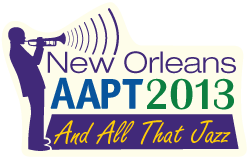Workshops Page
Did you know?
New Orleans was founded in the year 1718 by Jean Baptiste La Moyne, Sieur de Bienville. — www.atneworleans.com
Listed below is a current list of workshops planned for the 2013 winter meeting. Some details are subject to change.
All workshops will be held at Southern University at New Orleans (6400 Press Drive, New Orleans, LA 70126). The workshop will be held in the Old Science Building (Brown Hall – Building 6) and the New Science Building (Building 7). Click here to view a map of the campus and directions to the University. You can park in front of building 7 or beside building 8 (FYI- building 8 has been demolished and is now an empty lot).
You must pick-up your registration packet at the AAPT registration desk at the Hyatt Regency before leaving for Southern University. Buses will run between the two locations. Buses will depart from the first level of the Hyatt Regency behind the front desk. Buses will leave promptly at the times listed.
Click here to view Bus Schedule
Find out more and become a part of WM2013 on: Facebook| Twitter
Some photos courtesy of neworleanscvb.com




